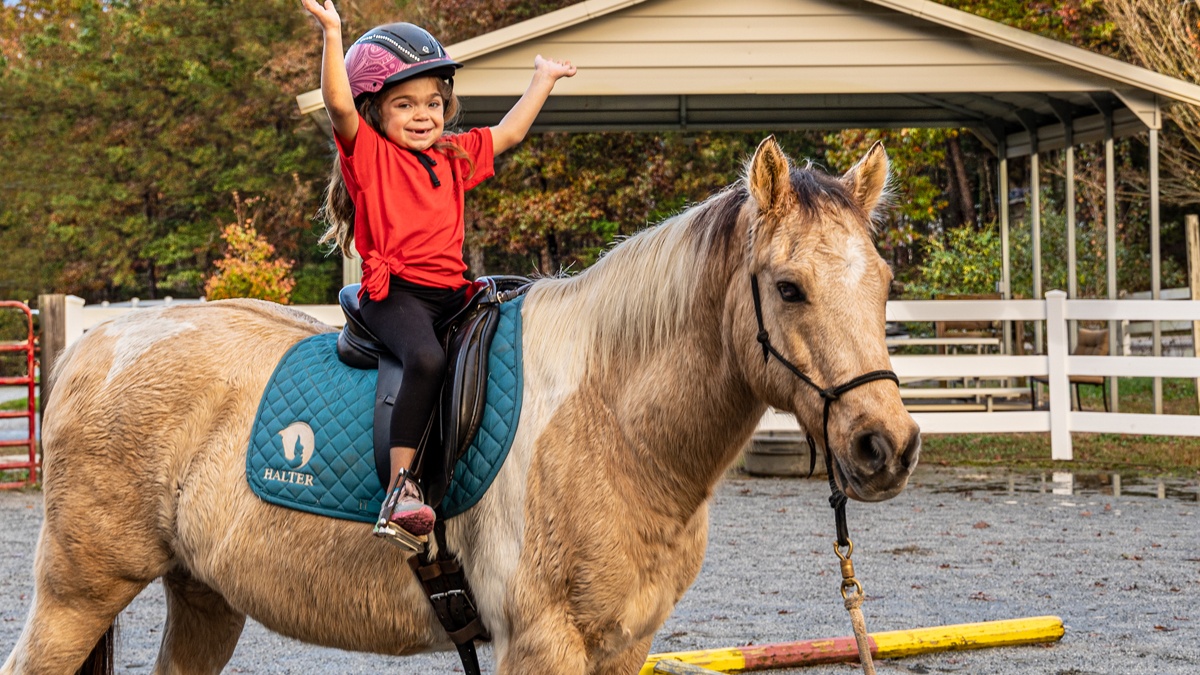“This program has helped our daughter so much! It is a blessing to so many!”
“My little one loves to ride the horses. He is learning to cope emotionally and physically with life through the horses, the therapists and helpful volunteers there.”
“I never knew that riding horses could have such an effect on young people that have special needs. I encourage everyone to learn more about HALTER. …”
Those are just a few of the many five-star reviews that HALTER – healing and learning through equine relationships – received. For parents, saying they are “grateful” for this program, located in Spartanburg, is a drastic understatement.
For more than 35 years, HALTER has provided therapeutic horseback riding programs to special needs children and young adults with emotional, cognitive and physical disabilities. From Down syndrome to attention deficit hyperactivity disorder to autism and children with traumatic emotional issues, HALTER works on these challenges utilizing the unique characteristics of horses. Conveniently located on the campus of the South Carolina School for the Deaf and Blind, HALTER provides services to schools and children in the community.
Nancy Paschall, executive director of HALTER and the current president of the Horses and Humans Research Foundation, has had a lifelong passion for horses, research and helping people who are experiencing all types of challenges. With a therapy background herself, she knows the impact that horses can have on people.
“It is amazing to watch these kids come out of their shells,” Paschall explained. “It is not just a pony ride. They learn life skills. They learn about boundaries, following directions and self-regulation. Their bodies strengthen physically as well.”
She said horses can read human emotions, which makes them the perfect animal for this type of work.
“Horses will prefer to be with people that they feel safe around, which is a great motivator to not have a temper tantrum around them because if you do, you won’t get to ride,” she explained.
HALTER teaches children about basic care of horses as well. They learn how to be responsible by taking the brushes out and then putting them away and how to use the saddle, which builds strength and requires gross and fine motor skills. The horses, which work about 10 hours a week, come to HALTER physically and emotionally healthy, usually from a prior career that has trained them to listen well and be safe. HALTER trains the horses to be mounted from an electric lift for children who are mobility challenged.
One child came to HALTER because he was experiencing debilitating anxiety – to the point that he refused to go to school. Paschall said her team worked with him through an equine assisted learning model that she developed. The boy has since learned breathing and grounding mindfulness exercises with horses and has gradually been returning to school. Paschall was quick to point out that EAL is not a substitute for psychotherapy.
Paschall confirmed that HALTER focuses on implementing the best practices based on research.
“My goal is to stay educated on the latest research and what it is telling us. We can then translate that into our programs,” she remarked.
Volunteers, who handle maintenance, assist with riders and horses and help out in the office, make up a big part of how HALTER provides services. Paschall said many of them are siblings or parents of current students, while others are in high school, college or medical school or are retirees. Even children can be volunteers.
Concerning the COVID-19 pandemic, Paschall noted: “We are outdoors and use our covered arena in inclement weather. The nature of horseback riding is already social distanced, so I encourage parents that would like to enroll their special needs child in an activity to consider HALTER.”
The HALTER Derby, a peer-to-peer social media-based fundraiser, will be held in April, and Horsing with HALTER, a silent and live auction event with dancing and barbecue, both online and in-person, is scheduled for Aug. 21. Donations and fundraisers cover about 75% of all the organization’s expenses. Programs average about $25 per week for one semester, and some insurance companies help cover the costs.
By Theresa Stratford
For more information on HALTER in Spartanburg, visit www.haltersc.org or call 864-586-1671.
